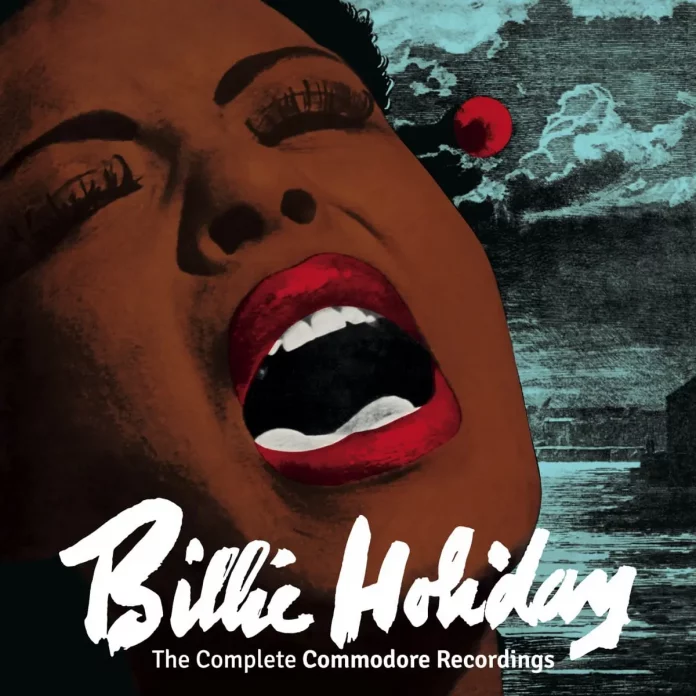An established star by 1939, Billie was determined to record her harrowing version of Strange Fruit. This was an outspoken protest song about brutal lynchings in America’s deep south, with bitterly explicit lyrics which still shock. In those racially volatile times it could be dangerous to speak out so strongly, and John Hammond, Billie’s boss at Columbia Records, judged the song riskily inflammatory, and refused to record it.
Undeterred, Billie persuaded Milt Gabler, of the jazz specialist label Commodore Records, to do so, with Hammond’s doubtless reluctant permission for one session. And so the opening track on this CD came to be a landmark performance, and perhaps the best-known and most repeated of her career. Issued as a single, it attracted much attention, whilst the B-side, Fine And Mellow, one of Billie’s few blues compositions, went down even bigger in Harlem juke-boxes. It was her biggest hit single. Completing the Commodore session, Yesterdays and I’ve Gotta Right To Sing The Blues became another hit single.
Five years later, after the American union recording ban of 1942-44, Billie recorded again for Commodore. In earlier days she’d been restricted to a single chorus or so, backed by some recruited stars who could solo memorably. On the Commodore sides, though they are still only of single length, she sings more continuously, with unobtrusive, mainly sectioned backing. Leader Eddie Heywood contributes tasteful piano intros, fills and bridges.
By now, the components of her unique style were virtually all in place. Though small and limited in range, her voice could express intense poignancy and yearning, irresistibly triggering a response in the listener. With instinctive artistry, her phrasing shifted the emphasis on words and personalised the lyrics to her own distinctive interpretation. She could reshape the contours of a melody like an improvising instrumentalist with effective, lingering timing. Her voice and breath control were not yet ravaged by drugs and alcohol, which would scar her late recordings. My Old Flame, I’ll Get By and I Cover The Waterfront – together with I’ll Be Seeing You and As Time Goes By, neither of which she would record again – rank with any of her finest work.
Of the 47 tracks on this two-CD set, just 16 were originally issued on Commodore. There are no less than 29 alternative takes, which nearly all repeat the same arrangements with marginal adjustments to tempo and Billie’s phrasing. They are all complete, and perfectly issuable as they stand, so one wonders why Milt Gabler (or Billie?) was being so particular! Several additional songs could surely have been recorded in this time. Two rare bonus tracks generously added feature Billie in the larger orchestral settings of Artie Shaw and Paul Whiteman, rounding off an excellent reissue, of particular interest to completist collectors, of these famous recordings by arguably the greatest vocalist in jazz.
Discography
CD1: Strange Fruit; Yesterdays; Fine And Mellow; I Gotta Right To Sing The Blues; Strange Fruit (alt); Yesterdays (alt); I Gotta RightTo Sing The Blues (alt); (2) How Am I To Know; My Old Flame; I’ll Get By; I Cover The Waterfront; How Am I To Know (3 alt takes); My Old Flame (3 alt takes); I’ll Get By (alt); I Cover The Waterfront (3 alt takes); (3) I’ll Be Seeing You; I’ll Be Seeing You (2 alt takes) (78.17)
CD 2: (3 cont.) I’m Yours; Embraceable You; As Time Goes By; I’m Yours (2 alt takes); Embraceable You (2 alt takes); As Time Goes By (alt); (4) He’s Funny That Way; Lover Come Back To Me; I Love My Man (aka Billie’s Blues); On The Sunny Side Of The Street; (5) He’s Funny That Way (2 alt takes, with horns); (4) He’s Funny That Way (2 alt takes); (5) Lover Come Back To Me (2 alt takes, with horns); (4) Lover Come Back To Me (alt); I Love My Man (2 alt takes); (6) Any Old Time; (7) Travelin’ Light; (76.45)
Holiday (v) with:
(1) Frankie Newton (t); Tab Smith (as, ss); Kenneth Hollon , Stanley Payne (ts); Sonny White (p); Jimmy McLin (g); Johnny Williams (b); Eddie Dougherty (d). NY, 20 April 1939.
(2) Doc Cheatham (t); Vic Dickenson (tb); Lem Davis (as); Eddie Heywood (p); Teddy Walters (g); John Simmons (b); Sidney Catlett (d). NY, 25 March 1944.
(3) as (2) except omit Walters. NY, 1 April 1944.
(4) Heywood (p); Walters (g); Simmons (b); Catlett (d). NY, 8 April 1944.
(5) as (4). Add Freddie Webster (t); Vic Dickenson (tb); Lem Davis (as).
(6) Artie Shaw and his Orchestra. NY, 24 July 1938.
(7) Paul Whiteman and his Orchestra. LA, 12 June 1942.
American Jazz Classics 99149
















